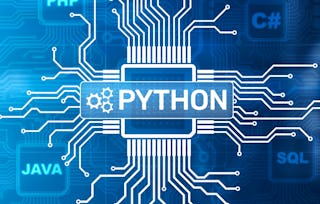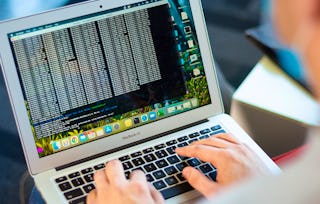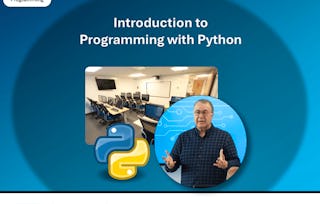In today’s society, uses for new technologies are broadening in scope and revolutionizing the world. Many new technologies automate redundant tasks so people may complete tasks of greater priority. These new automated technologies depend on the constant innovation of software. To develop software that can increase our efficiency and change the world for the better, it is vital to understand how to code using different programming languages. This specialization introduces the basics of the Python programming language and teaches how to implement solutions to real-world problems using Python syntax. Topics in this course range from utilizing integrated development environments (IDEs) to implementing Python syntax in scripts. Some of the position titles that may benefit from this course are computer scientist, computer engineer, software engineer, software developer, software tester, electrical engineer, mechanical engineer, chemical engineer and aerospace engineer.

Introduction to Python

Introduction to Python
This course is part of Python: A Guided Journey from Introduction to Application Specialization

Instructor: Adwith Malpe
Access provided by Abu Dhabi National Oil Company
5,203 already enrolled
35 reviews
Recommended experience
What you'll learn
Students will master the basic skills of coding in python and will be able to understand the syntax.
Skills you'll gain
Details to know

Add to your LinkedIn profile
9 assignments
See how employees at top companies are mastering in-demand skills

Build your subject-matter expertise
- Learn new concepts from industry experts
- Gain a foundational understanding of a subject or tool
- Develop job-relevant skills with hands-on projects
- Earn a shareable career certificate

There are 5 modules in this course
In today’s society, uses for new technologies are broadening in scope and revolutionizing the world. Many new technologies automate redundant tasks so people may complete tasks of greater priority. These new automated technologies depend on the constant innovation of software. To develop software that can increase our efficiency and change the world for the better, it is vital to understand how to code using different programming languages. This specialization introduces the basics of the Python programming language and teaches how to implement solutions to real-world problems using Python syntax. Topics in this course range from utilizing integrated development environments (IDEs) to implementing Python syntax in scripts. Some of the position titles that may benefit from this course are computer scientist, computer engineer, software engineer, software developer, software tester, electrical engineer, mechanical engineer, chemical engineer and aerospace engineer. You do not need programming or computer science experience to learn the material in this course. This course is open to anyone who is interested in learning how to code and write programs in Python. We are very excited that you will be learning with us and hope you enjoy the course!
What's included
1 video1 reading
This course covers the basics of Python and provides you with knowledge to solve real-world problems using Python.
What's included
6 videos6 readings1 assignment2 discussion prompts
In this module, you will learn what input and output data are, how to handle input and output data, how to work with data of different data types, how to process data using arithmetic operators, and how to display output.
What's included
7 videos12 readings3 assignments1 peer review1 discussion prompt
In this module, you will learn how to manipulate control structures to make decisions when handling data and will learn how to use loops to eliminate the need to perform redundant tasks.
What's included
7 videos8 readings3 assignments
In this module, you will learn how to create functions to make code more modular and to complete tasks used many times in programs.
What's included
4 videos9 readings2 assignments1 peer review
Earn a career certificate
Add this credential to your LinkedIn profile, resume, or CV. Share it on social media and in your performance review.
Instructor

Offered by
Why people choose Coursera for their career

Felipe M.

Jennifer J.

Larry W.

Chaitanya A.
Explore more from Computer Science

University of Leeds

Arizona State University

Illinois Tech

Logical Operations

